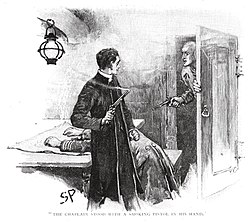Philosophy:Smoking gun
The term "smoking gun" is a reference to an object or fact that serves as conclusive evidence of a crime or similar act, just short of being caught in flagrante delicto. "Smoking gun" refers to the strongest kind of circumstantial evidence, as opposed to direct evidence. Direct evidence would be eyewitness testimony of someone who saw an actus reus (the actual alleged act), while connected events (the preceding chase, etc.) are considered circumstantial.[1]
Phrase origin
The phrase originally came from the idea that finding a very recently fired (hence smoking) gun on the person of a suspect wanted for shooting someone would in that situation be nearly unshakable proof of having committed the crime. A variant of the phrase (as "smoking pistol") is used in the Sherlock Holmes story, "The Adventure of the Gloria Scott" (1893).[2]
Extended meaning
In addition to this, its meaning has evolved in uses completely unrelated to criminal activity: for example, scientific evidence that is highly suggestive in favor of a particular hypothesis is sometimes called "smoking gun evidence".[3]
See also
- Incontrovertible evidence
- Legal burden of proof
- Nixon White House tapes § "Smoking Gun" tape
References
- ↑ Walton, Douglas (2010). Legal Argumentation and Evidence. Penn State Press. p. 78. ISBN 978-0271048338. https://books.google.com/books?id=u_ZCcPqwU_YC&pg=PA78.
- ↑ Safire, William (26 January 2003). "Smoking Gun". The New York Times. https://www.nytimes.com/2003/01/26/magazine/the-way-we-live-now-1-26-03-on-language-smoking-gun.html. Retrieved 6 May 2015. ""We rushed into the captain's cabin . . . there he lay with his brains smeared over the chart of the Atlantic . . . while the chaplain stood with a smoking pistol in his hand at his elbow.""
- ↑ "Smoking Gun". https://www.merriam-webster.com/dictionary/smoking%20gun. Retrieved 30 January 2018.
 |


